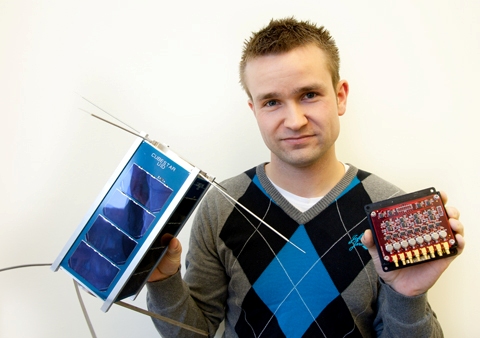By Kalwinder KaurMay 15 2012
Researchers at the University of Oslo (UiO) are on a mission to find out the reason behind the interference of northern lights with satellite communications, GPS navigation and radio communications. They will be launching 20 satellites with unique small instruments to find out the happenings in plasma clouds.
 "20 satellites will be filled with instruments from UiO," says Tore André Bekkeng. Photo: Yngve Vogt
"20 satellites will be filled with instruments from UiO," says Tore André Bekkeng. Photo: Yngve Vogt
Satellites play a critical role in navigation and communication. When violent solar winds strike the Earth they cause “northern lights.” Charged particles in these solar winds produce the turbulence in the ionosphere at an altitude of 80 to 500 km. The ionosphere is made up of plasma clouds having electrical particles. The turbulence blocks, interferes or reflects the signals incorrectly. These lights affect aviation and off shore activity, which may lead to aircraft losing ground contact and oil tankers and ships facing difficulty in navigation.
Researchers around the globe are collaborating to discover the happenings in plasma clouds, which may help forecast space weather in the future. Many satellites are required for this study as a satellite takes more than 90 minutes to complete orbiting the Earth. As the phenomena under study gets over in around an hour a single satellite will not be sufficient.
The universities partaking in the study will be launching 50 small satellites above the Earth at an altitude of 320 km. This will enable better coverage and the satellites will pass the specified geographical points at short intervals. Air resistance will reduce the speed of the satellites and also degrade their orbit. This will allow study of the different layers in the ionosphere.
Tore André Bekkeng at UiO, a research fellow, has developed the algorithms, the electronics and has designed the instrumentation to reduce power consumption. The instrumentation has caught the interest of NASA and the ESA.
Disclaimer: The views expressed here are those of the author expressed in their private capacity and do not necessarily represent the views of AZoM.com Limited T/A AZoNetwork the owner and operator of this website. This disclaimer forms part of the Terms and conditions of use of this website.